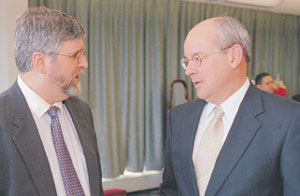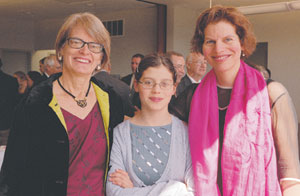 |
|
||
|
|||
2002
Metcalf Awardees
Metcalf awards honor four teachers of excellence
By Hope Green and Tim Stoddard
When art inspires time travel
Fred Kleiner was doubly honored during Commencement weekend. Besides a
Metcalf Award for Excellence in Teaching, he received a CAS Faculty Award
for Excellence in Academic Advising.
|
|
|
| Metcalf honoree Fred Kleiner, a CAS professor of art history and archaeology (left), speaks with Provost Dennis Berkey on Commencement day. Photo by Vernon Doucette | |
"Teaching and advising usually go hand in hand," he says. "Teaching
is not just standing up and lecturing people; it's connecting with them
as individuals."
Kleiner, a CAS professor of art history and archaeology in the department
of art history, has been on the BU faculty since 1978. His Introduction
to Art History course is often an undergraduate's first exposure to serious
art scholarship.
"We cover thousands of years, starting in the prehistoric caves and
going all the way through to the early Middle Ages," he says, "so
every week we're in a different part of the world and a different culture.
It can be difficult for students to soak that up all at once, and the
trick is to make it interesting and comprehensible at the same time."
"Simply amazing," "fantastic," "astonishing,"
and "incredible in every way" are just some of the superlatives
that students have used to describe Kleiner's teaching style. Graduate
students praise him as a thoughtful and ardent mentor.
"Professor Kleiner seems to appreciate the tremendous responsibility
of an instructor," one student wrote in a letter of recommendation
to the Metcalf Committee. "He considers not just what he will teach,
but how best to communicate, to evaluate, to encourage, and to inspire.
In Professor Kleiner's hands, art becomes a medium for traveling through
time and around the world, to experience the wonders of distant cultures."
Kleiner is the principal author of recent editions of Gardner's Art Through
the Ages, which won the 2001 McGuffey Prize as best college textbook in
the humanities and social sciences, and is the longtime editor-in-chief
of the American Journal of Archaeology. He is the host of the six-part
Cablevision series Art History, scheduled to appear later this year.
Prior to joining the faculty at BU, Kleiner taught at the University of
Virginia and was a visiting professor at Yale University.
The College of Arts and Sciences bestows three academic advising awards
on members of the faculty each year. Besides Kleiner, this year's winners
are Deborah Belle, a CAS associate professor of psychology, and Wayne
Snyder, a CAS associate professor and director of undergraduate studies
in the department of computer science. The awards were presented at Class
Day, May 18, along with the student prizes for CAS graduating seniors.
Another Africa revealed
Diana Wylie is widely recognized for her ability to make the history of
Africa and Africans relevant to the lives of students. In lectures laced
with indigenous music and pictures from her extensive travels, she dispels
media-made myths about the continent and nurtures in undergraduates that
all-important habit: critical thinking.
"If students come with images of Africa as only hungry, or as primitive,
or as dying rather than vital and creative," she says, "then
they're pleasantly surprised to learn that for all the continent's problems,
it is also a place where people live long, fulfilling lives, have families,
and make art. That's not the aspect of Africa that's generally publicized
in the press."
|
|
|
|
Diana Wylie, a CAS associate professor in the African Studies Center and the department of history (left), with her niece, Xenia Pantos, and her sister, Pamela Wylie, on Commencement day. Photo by Vernon Doucette |
|
Wylie, a CAS associate professor in the African Studies Center and the
department of history, has spent three decades conducting research across
the African continent, including stints as a Peace Corps worker in Kenya
and as a journalism teacher at Algeria's University of Oran. She is the
author of Starving on a Full Stomach: Hunger and the Triumph of Cultural
Racism in Modern South Africa (University Press of Virginia, 2001) and
contributed a segment to the Oxford History of the British Empire on the
human impact of African colonization.
In undergraduate courses, Wylie has been known to engage her students
in role-playing exercises, such as a reenactment of Nelson Mandela's trials
for treason in the early 1960s. To enliven three-hour graduate seminars,
she often turns over the last hour to a student presenter.
"Anybody with the proper degrees can be a professor, but only a gifted
few can be a teacher," a former student wrote in her letter of recommendation
to the Metcalf Committee. "Professor Wylie is one of these gifted
few . . . [She] infected me with an increased thirst for knowledge and
an increased desire to engage in scholarship."
Wylie joined the BU faculty in 1994, and also has taught at Yale, Harvard
University, Mount Holyoke College, and Vassar College. She plans to use
part of her Metcalf Award money to study for a month this summer in Fez,
the royal capital of Morocco, where she is starting a new research project
on architecture and urbanism. The rest of the award money will go toward
a December trip to South Africa, where she will conduct research for a
book about the life of artist Thami Mnyele, who died in a South African
army raid on Botswana in 1985.
"On time, in spec, and within budget"
Theo de Winter doesn't want to be an untapped resource at Boston University.
In his 32 years at BU, he has earned a reputation for energizing student
interest in the subject of manufacturing engineering by engaging students
outside of the classroom. Every Tuesday, he is seen eating lunch with
aspiring engineers at Shelton Hall; on Fridays, he has lunch with students
at Myles Standish Hall.
"I think students are generally reluctant to come to faculty for
career and life advice," he says. "It's a shame, because faculty
are a resource that students have paid for, and if they don't use us,
they really lose a lot."
|
|
|
| Theo de Winter, an ENG associate professor in the department of manufacturing engineering, accepting his award. Photo by Kalman Zabarsky | |
De Winter's efforts have made him a popular advisor. "His office
was always filled with students," recalls one student. "We left
with a better understanding of resources available to us in the manufacturing
arena, a newfound appreciation for the values and professionalism with
which we should carry ourselves, and a clearer picture of our responsibilities
to the industry."
In his lectures, de Winter balances abstract scientific principles with
down-to-earth advice about surviving in industry. Before he came to BU
in 1962, joining the faculty full-time in 1969, de Winter began his professional
career at Pratt & Whitney Aircraft in 1956 and held senior engineering
posts at Dynatech Corporation and AVCO before cofounding the Magnetic
Corporation of America in Waltham. His appreciation for the realities
of the business world and deft ability to convey them through humorous
anecdotes have enabled him to give his students the technical skills to
succeed. De Winter never allows his students to forget that abstract genius
is no substitute for "on time, in spec, and within budget."
"Professor de Winter taught me the meaning of manufacturing engineering
and how it relates to 'real-life' applications," says a former student.
"He showed me what it meant to be an engineer and, most importantly,
what it meant to become a good engineer, using knowledge, common sense,
and a good set of ethics."
|
![]()
31 May 2002
Boston University
Office of University Relations


